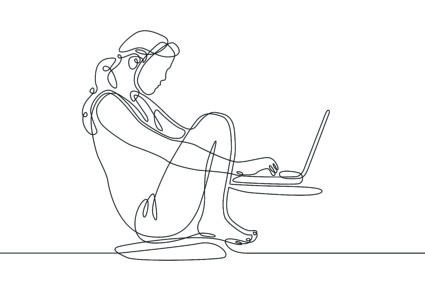
Van Der Beek revealed in 2024 that he was being treated for colorectal cancer.


Our April pick for the PBS NewsHour-New York Times book club is Emily Chang's "Brotopia." Become a member of the Now Read This book club by joining our Facebook group, or by signing up to our newsletter. Learn more about the book club here.
Journalist Emily Chang devotes many pages in "Brotopia: Breaking Up the Boys' Club of Silicon Valley" to how the tech industry has failed to produce an inclusive, equitable workforce. She calls out Silicon Valley's issues with gender discrimination, sexism and sexual harassment. But she also describes how Silicon Valley can move forward, and the rising workforce of young girls and women who are ready to take the reins.
Below, see Chang's annotations of a page of "Brotopia" in which she meets a group of teenage girl coders, who discuss what it's like to be a girl in tech, and what they want to do when they grow up. (Click on the yellow to see the annotations.)
TECH'S RISING WORKFORCE
On a Friday afternoon in the summer of 2017, I sat down with a group of teenage girls at Gott's Roadside restaurant on the bustling Embarcadero waterfront in San Francisco. They had come into the city from high schools all over the Bay Area, and now over french fries and chicken tenders they were talking about their experiences learning how to code. All of them had worked with Girls Who Code (GWC), a nonprofit that offers after-school clubs for middle-and high-school-aged girls and immersive summer programs held at tech company offices.
Areeta Wong, sixteen, joined the coding club at San Mateo High School. "When I typed something up and it would magically appear on the screen, that realization that you can create something that works right away is amazing," Wong said. Zaynah Shaikh, a nineteen-year-old computer science major who had recently graduated from the GWC program, added, "Seeing the program work, I think it's pretty empowering. With code you can do so many things." Ria Thakkar, seventeen, taught herself how to code using Khan Academy online tutorials, then helped start the GWC club at her school. "[Learning to code] was a really hard process for me, and I thought, 'How do I make it easier for other girls to do?'"
Ashley Chu, fifteen, joined a GWC club during her sophomore year in high school and attended her first hackathon a few months later. "But the thing is, I was on an all-guys team. They had already taken AP computer science and were really into coding when I was just new, and I felt like I just didn't belong," Chu said.
Still, Chu finished the hackathon. "I was scared, frustrated with my code, and I wanted to quit, but we went through with it," she says. The hackathon has not dampened her aspirations. "I am a really big dreamer, and I've always wanted to be an inventor," Chu said.
Meet the next-gen potential workforce of tech. Shaikh wants to combine her programming skills with her love of sports to make a prod- uct that will encourage more young girls to try athletics. Thakkar is obsessed with airplanes and would like to build an aviation app. Chu is a Disney fanatic who would love to join the company's Imagineering research and development arm. Julie Vu, who says she's given up the idea of coding because of what she's read about sexism at Uber, would like to become a recruiter at a tech company so she can help bring in more women and underrepresented minorities…
Sustain our coverage of culture, arts and literature.